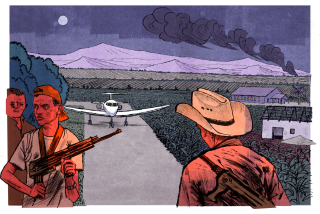Massacre leaves 27 dead in northern Guatemala
At least 27 people were slain early Sunday in a remote area of northern Guatemala that has become a key base for Mexican drug-trafficking groups, authorities said.
Police said a small army of gunmen attacked workers on a coconut farm in the northern province of Peten, a zone that has become increasingly dangerous as Mexican drug smugglers extend operations in Central America to escape a crackdown at home.
The victims included 25 men and two women, all of whom were decapitated, according to Jaime Leonel Otzin, director of Guatemala’s National Civil Police. He said witnesses reported that the attack was carried out by 200 gunmen, who arrived in buses.
Authorities had not determined a motive.
Otzin said police were investigating a possible link to the killing a day earlier of Haroldo Leon. He was the brother of a suspected trafficker, Juan Jose “Juancho” Leon, who was slain by gunmen in 2008 in a hit attributed to the Zetas gang.
The Guatemala office of the United Nations High Commissioner for Human Rights issued a statement condemning the massacre as a further sign of the state of lawlessness in Peten, a region it said is beset by narco-trafficking, oligarchic landownership, illegal cattle-raising and threats to evict rural dwellers from their plots.
Peten, which hugs Mexico’s southern border, is home to ancient Maya ruins and some of the region’s most scenic countryside.
But isolation and thin police forces have allowed Mexican trafficking gangs such as the Zetas to build clandestine airstrips for smuggling cocaine north to the United States.
Regional officials and analysts say Mexican President Felipe Calderon’s 4-year-old crackdown on drug gangs has sent them scrambling for other spots to package and transfer narcotics bound for the United States.
Traffickers have opted for relatively isolated spots in Central America, where weak law enforcement and longstanding corruption provide limited risk of detection or arrest. Peten is especially useful to smugglers because the border with Mexico is only lightly patrolled.
The influx of Mexican traffickers, most notably the Zetas and the cartel run by Joaquin “El Chapo” Guzman that is based in the western Mexican state of Sinaloa, has stoked worry that criminal groups could overwhelm Central American nations.
Countries such as Guatemala and El Salvador are still rebuilding from long civil wars and already have high homicide rates.
The threat from the drug cartels was a key subject of talks when President Obama visited El Salvador in March to meet with Salvadoran President Mauricio Funes.
Guatemalan President Alvaro Colom declared a state of emergency in the northern province of Alta Verapaz in December, deploying army patrols to seize territory in effect ruled by the Zetas, one of Mexico’s most vicious crime groups.
Authorities in Honduras have discovered cocaine-processing labs, and officials in El Salvador found a suspected Zetas training camp and $15 million in drug funds buried in plastic barrels.
Times staff writer Ellingwood reported from Mexico City and special correspondent Renderos from San Salvador.
More to Read
Sign up for The Wild
We’ll help you find the best places to hike, bike and run, as well as the perfect silent spots for meditation and yoga.
You may occasionally receive promotional content from the Los Angeles Times.






